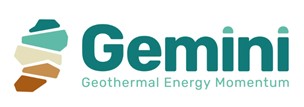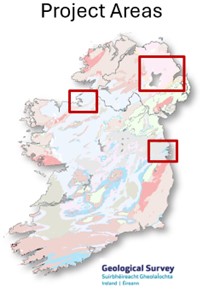GEMINI Project
Geothermal Energy: €20m (£17.3m) cross border investment in demonstrator projects for public sector buildings on the island of Ireland

The School of Earth Sciences at UCD is pleased to announce its involvement in the GEMINI (Geothermal Energy Momentum on the Island of Ireland), a new €20/£17.3m multi-partner, all-island geothermal energy demonstration project. School of Earth Sciences project team consists of Dr Kara English, Dr Koen Torremans, Dr Tom Manzocchi, Prof John Walsh, Dr Vincent Roche and Dr Pablo Rodriguez-Salgado.
Over the next four years the GEMINI project will help reduce greenhouse gas emissions associated with heat production, a goal central to EU, UK and Irish strategies to meet 2050 emissions targets. The project is led by Codema, Dublin’s Energy Agency, and is supported by the PEACEPLUS programme managed by the Special EU Programmes Body (SEUPB) and endorsed by the Department of the Environment, Climate and Communications, Ireland and the Department for the Economy, Northern Ireland. UCD School of Earth Sciences will be working on the 3D subsurface modelling of the geothermal systems in the Dublin area and the border regions.
Geothermal energy is a secure, local, near-zero emissions energy source which is suited to both urban and rural areas, including individual users or networks with larger heat demands. The geothermal technologies deployed in this project will use heat energy from the Earth to feed large-scale heating and cooling systems in public sector buildings such as swimming pools, housing projects, utilities offices and a university campus.
The GEMINI project will support the development of the geothermal sector and accelerate the uptake of geothermal energy through four real-world pilot installations, 3 shallow (<500m) in Sligo and Belfast, and one deep (approx. 2km) in Grangegorman Technological University Dublin. Additional data will also be collected for potential future sites, thereby ensuring that the GEMINI work will have wider impacts for the island by increasing and improving our knowledge of the sub-surface and our island’s potential geothermal resources. This information will also help to inform new policies, guidelines and supports for the sector through geological heat potential maps, cross border policy recommendations, toolkits for decision makers (homeowners, planners, developers and local government), community engagement guidelines, and business and skills development activities.


Project Partners
Codema; RML Ltd; Geological Survey Ireland (Department of the Environment, Climate and Communications); Geological Survey of Northern Ireland (United Kingdom Research and Innovation); Northern Ireland Housing Executive; Northern Ireland Water; Sligo County Council; Dublin Institute for Advanced Studies; Irish Central Border Area Network; Queen’s University Belfast; Think-tank for Action on Social Change; Technological University Dublin; University College Dublin School of Earth Sciences; Ulster University; Atlantic Technological University.
Associated partners:
Dublin City Council; Antrim and Newtownabbey Borough Council; Belfast City Council; Supporting Communities NI; Cavan County Council; Grangegorman Development Agency; South West College; Mayo Sligo Leitrim Education and Training Board.
For more information contact: (opens in a new window)kara.english@ucd.ie